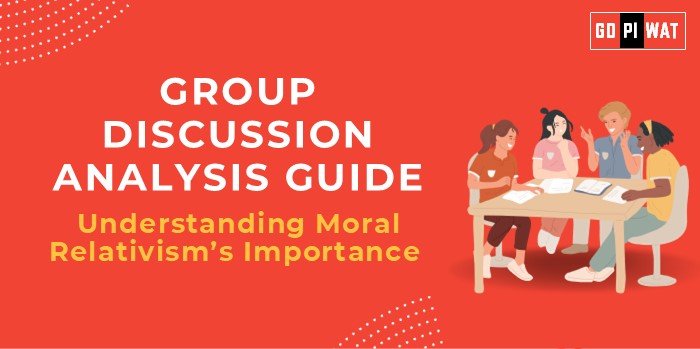📋 Group Discussion (GD) Analysis Guide
🌐 Introduction to Moral Relativism in Multicultural Societies
Opening Context: In a globalized world marked by cultural diversity, moral relativism, the idea that morality is culture-specific and subjective, gains both prominence and controversy. It is crucial for B-school aspirants to grasp its nuances, given its relevance in global leadership and ethical decision-making.
Topic Background: Rooted in philosophical traditions like those of Herodotus and later expanded by thinkers like Franz Boas, moral relativism argues against universal moral standards. Its implications are deeply felt in multicultural societies, where diverse values coexist but sometimes conflict.
📊 Quick Facts and Key Statistics
- 🌍 Global Migration Figures: Over 281 million people are international migrants (UN, 2023), showcasing cultural intermingling.
- 🌐 Cultural Diversity: Countries like India host 2,000+ ethnic groups and 22 official languages, emphasizing the challenge of unified ethics.
- 💼 Workplace Impacts: 85% of global executives believe diversity boosts innovation, but 67% report conflicts due to cultural misunderstandings (McKinsey, 2022).
👥 Stakeholders and Their Roles
- 🏛️ Governments: Promote policies respecting cultural values while safeguarding human rights.
- 🏢 Corporate Sector: Address ethical dilemmas in culturally diverse teams.
- 🌏 International Organizations: Mediate conflicts where cultural and universal ethics collide.
- 🎓 Academicians and Think Tanks: Explore frameworks for ethical coexistence.
🏆 Achievements and Challenges
✨ Achievements:
- 🤝 Enhanced Social Harmony: Acceptance of relativistic morals reduces cultural conflicts, as seen in multicultural hubs like Canada.
- 📈 Corporate Success Stories: Diversity-driven innovation in global companies like Google and Procter & Gamble.
- 📜 Policy Inclusivity: Examples include India’s personal law system accommodating religious practices.
⚠️ Challenges:
- ❓ Ethical Dilemmas: Clash between cultural practices (e.g., arranged marriages) and universal values (e.g., individual autonomy).
- 🚨 Human Rights Issues: Practices like female genital mutilation pose challenges to universal ethics.
- 🌍 Global Comparisons: While Scandinavian countries emphasize universal moral principles, the USA balances individual freedom with cultural diversity.
💬 Structured Arguments for Discussion
- ✔️ Supporting Stance: “Accepting moral relativism fosters inclusion and respects cultural uniqueness, essential for peaceful coexistence.”
- ❌ Opposing Stance: “It can undermine universal human rights, leading to ethical compromises on fundamental issues.”
- ⚖️ Balanced Perspective: “While moral relativism respects diversity, boundaries must exist to ensure fundamental human rights are upheld.”
🛠️ Effective Discussion Approaches
- 🎯 Opening Approaches:
- 📊 Statistical Impact: “With 281 million migrants globally, respecting cultural values is no longer a choice but a necessity.”
- 📖 Philosophical Angle: “Herodotus’s assertion of cultural relativity remains vital today in our interconnected world.”
- 🔄 Counter-Argument Handling: Recognize merits of opposing views and emphasize solutions like ethical frameworks balancing relativism with universality.
🔍 Strategic Analysis of Strengths and Weaknesses
- 💪 Strengths: Promotes inclusivity; avoids ethnocentrism.
- ⚡ Weaknesses: Risk of ethical relativism enabling harmful practices.
- 🌟 Opportunities: Develop global ethical guidelines.
- ⚔️ Threats: Conflicts between cultural norms and human rights.
📚 Connecting with B-School Applications
- 🌎 Real-World Applications: Useful in cross-cultural management and global leadership modules.
- ❓ Sample Interview Questions:
- “Should global businesses adopt universal ethics or respect cultural practices?”
- “How does moral relativism influence leadership decisions?”
- 💡 Insights for B-School Students: Encourages critical thinking in ethics, essential for navigating globalized business environments.


